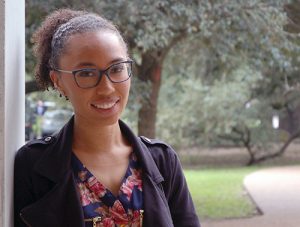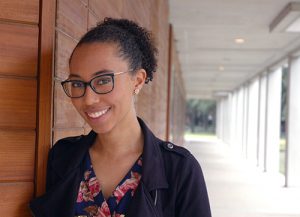 “The biggest challenge to my success in computer science? Me. I think I’m my biggest challenge,” said computer science senior Tiffany Stuart. “I didn’t switch to CS until I was a sophomore and I often felt like a double-minority: African American and female. If I did poorly, I immediately thought, ‘I shouldn’t be here.’”
“The biggest challenge to my success in computer science? Me. I think I’m my biggest challenge,” said computer science senior Tiffany Stuart. “I didn’t switch to CS until I was a sophomore and I often felt like a double-minority: African American and female. If I did poorly, I immediately thought, ‘I shouldn’t be here.’”
She even wondered if – when she got a job – there would be any engineers who looked like her. Then Stuart attended the Grace Hopper Celebration (GHC) of Women in Computer Science. “It was the first time I’d seen so many African American female engineers and computer scientists, plus they were so successful and at so many companies. Now I know that there may not be many of us, but we do exist and can do well in the field.”
Stuart came to Rice intending to major in Bioengineering, but she discovered she enjoyed both the problem-solving approach and the rapid results of her computer science courses, “with coding, you see the results immediately,” she said.
She did well in her first COMP course but not so well in COMP 182. Stuart said, “I didn’t have a lot of preparation in high school, and I was constantly having to catch up [to the students who seemed to easily grasp the material]. But you have to keep going, even when you are doing poorly. You will eventually get it.”
Although she did not pursue an internship until her junior year, she was paired with a great mentor that summer. In one of her meetings with her manager, she expressed concern about her low GPA and wondered out loud if she would get a job offer. Her manager told her she didn’t have to put her GPA on her resume.
Stuart shared her manager’s advice on how to answer a direct question about grades. “If someone asks your GPA, just state it and move on. Don’t be ashamed [of the number] if you were working hard in all your classes. Your GPA is not what defines you.”
She also advises CS students to try to avoid isolation. Stuart said, “I definitely waited too long before finding a community. Get involved. Find a group of friends to do homework with – especially women and minorities. CS is not a major where you think about collaborating on [how to tackle the problem sets]. It’s also important to go to office hours and get help from your professors as well. I feel like –particularly in CS and Rice – we all think we should be doing this work entirely on our own. ‘Everyone else is doing well’, you think –and maybe you don’t necessarily have a bunch of friends who are taking the same courses.”
Stuart said switching to CS in her sophomore year also contributed to some of her own feelings of isolation. She only knew one friend who also made the switch at the same time, and said they were so focused on catching up and keeping up that they didn’t necessarily spend time seeking out similar students.
 Finally, she showed up to a CSters meeting at the end of her junior year. “I didn’t even know about the club, but as I met more people in my classes I was asking them how they knew about all these events they kept going to. They told me about CSters. When I went to my first meeting, I saw all these girls who were in my classes and I hadn’t realized it.”
Finally, she showed up to a CSters meeting at the end of her junior year. “I didn’t even know about the club, but as I met more people in my classes I was asking them how they knew about all these events they kept going to. They told me about CSters. When I went to my first meeting, I saw all these girls who were in my classes and I hadn’t realized it.”
CSters is the student club offering support to women in computer science. The members provide an active mentoring program, study breaks, opportunities to shadow women engineers on the job, and industry-sponsored technical talks by female alumni. Stuart realized that although her Rice courses were similar to those of several other women, their participation in CSters had helped them find and prepare for internships as early as their freshman year.
She also discovered the National Society for Black Engineers (NSBE) as a junior. “I had known about it, but never attended meetings until my junior year. In NSBE, I was surrounded by people who looked like me and had similar experiences. That spring, I went to their annual conference and loved it. Six months later, I went to Grace Hopper.”
Only in her senior year did Stuart begin to gain confidence in her own abilities. “Last semester, my first project in compilers was terrible. I thought I was going to fail the course, but Keith and Linda encouraged me to stay in it, focus on the future, and later helped me debug the program that I did poorly on. I ended up doing well on everything else, and it was the first class when I really began to think I was getting it.”
That semester, she was also completing multiple job interviews, and the work she was doing in COMP 412 gave her a lot of projects to talk about. She said, “For a few weeks, I think I spent more days in interviews than in class. I was seriously considering four or five companies, and the more interviews I did, the more confidence I had in the next one. Getting a job is selling yourself – of course you need to study and prepare for the interviews, but you also need to be confident in yourself.”
Stuart realized late in the interview process that her resume did not show off all her strengths. “One of my interviewers said after the recruiters started talking to me, it was obvious I knew what I was doing.”
Shortly before attending GHC in October, Stuart was contacted by recruiters from Apple. “They found my resume in the GHC participants’ database and reached out to me, but I was interviewing with other companies during the conference. After the conference, I did my phone screens and a coding challenge, but there was a long time lag between each step and I was going to accept another offer.
That was when Apple called with in invitation for another phone screening that might lead to an onsite visit. Stuart declined, explaining her intention to accept a different job offer the next week. Her Apple recruiter urged her to fly out to the Bay Area in the next two days. Stuart completed the next set of interviews and accepted an offer from Apple before the deadline to submit her decision to the other employer. It was an exciting moment for a student who’d previously felt like an imposter.
Tiffany Stuart completed her B.A. in CS in 2017.
